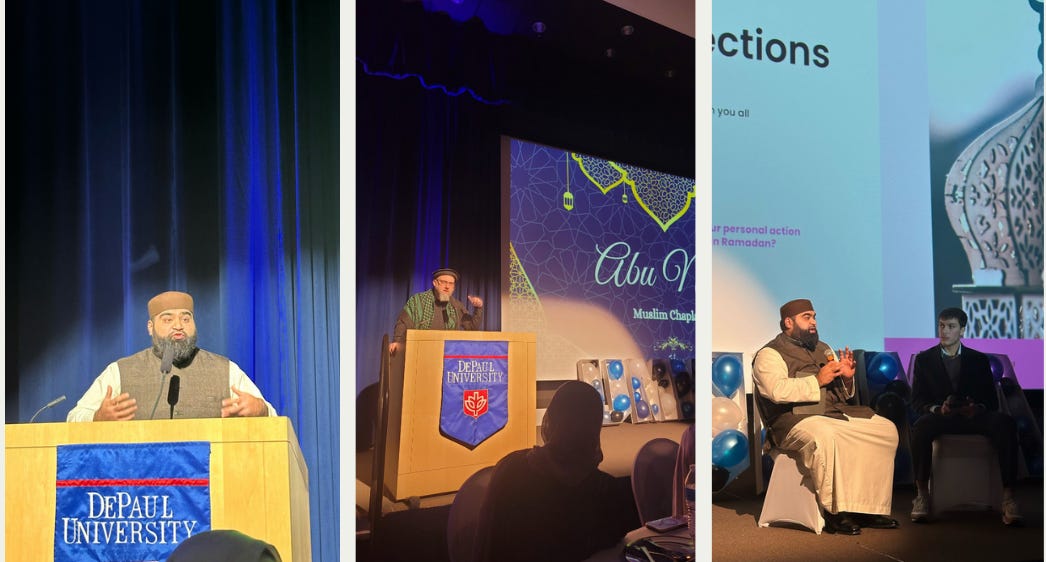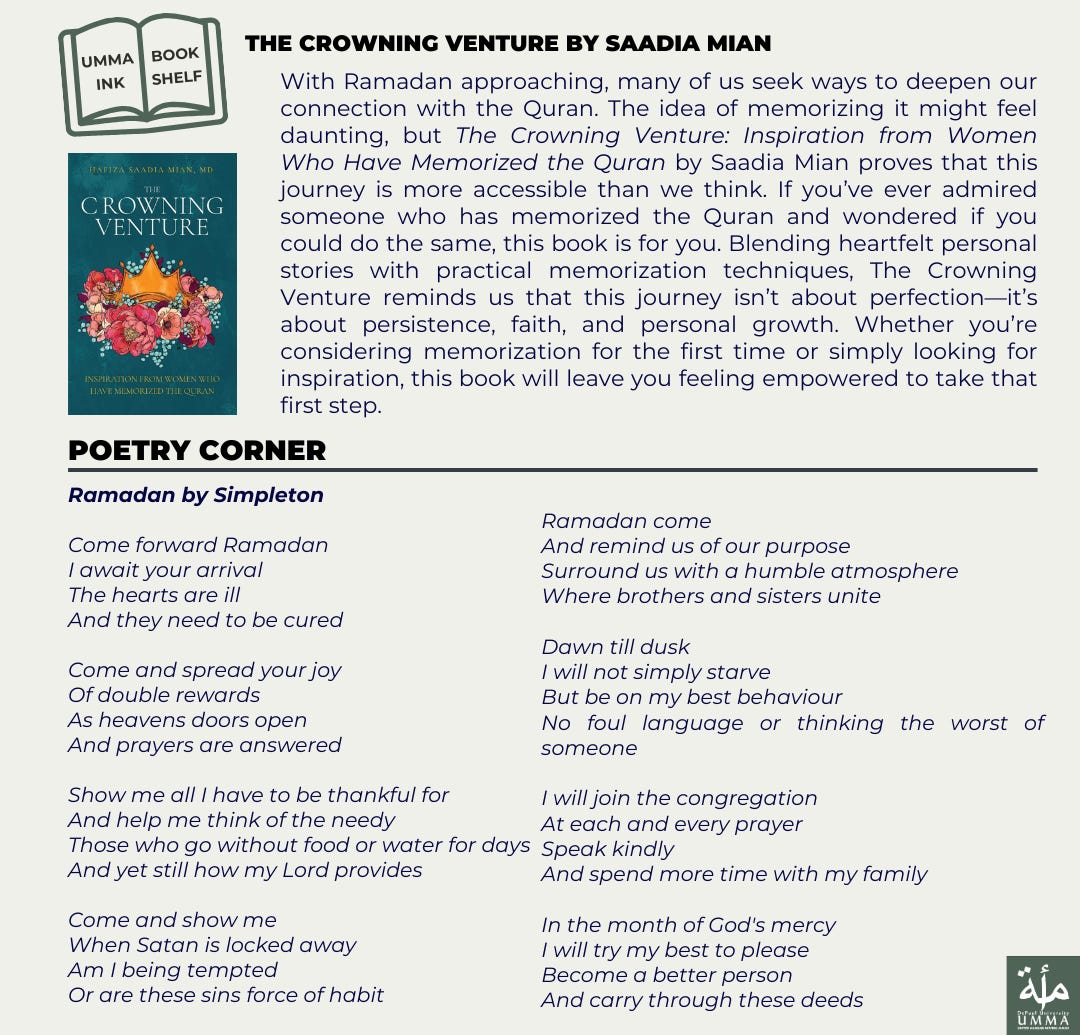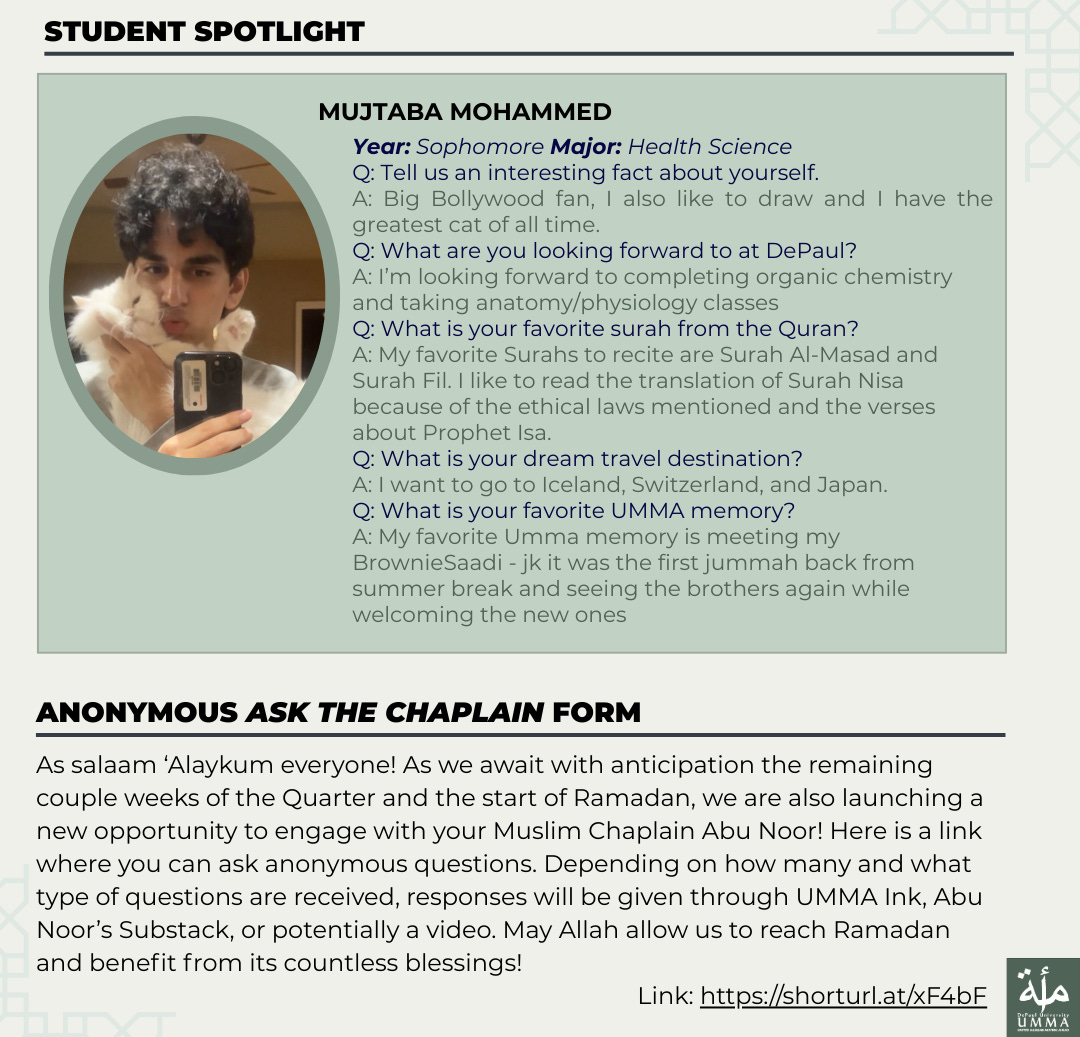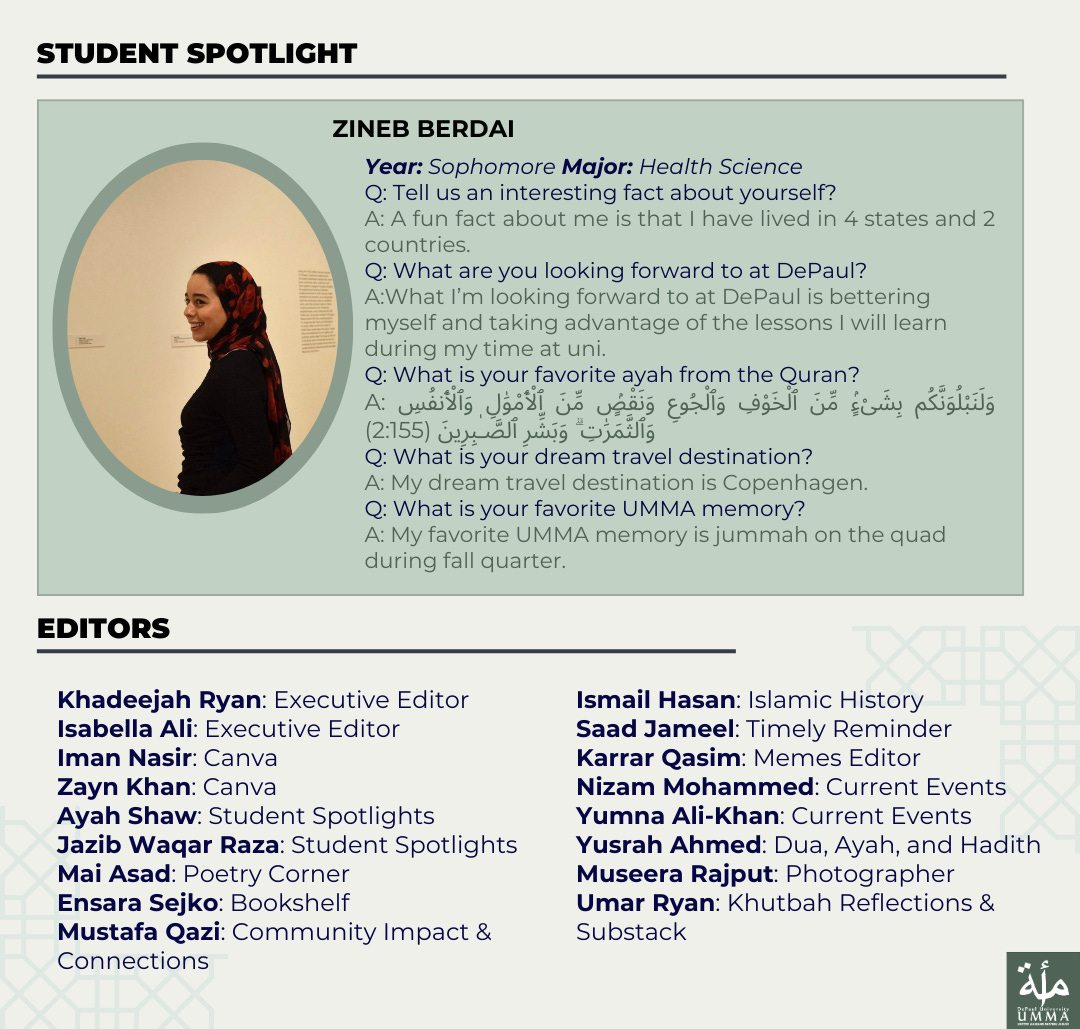Salaam everyone! We hope you are taking time to set goals and prepare for Ramadan as it quickly approaches. May Allah swt make this Ramadan a means of purification, forgiveness, and nearness to Him, Ameen!
-The UMMA Ink Team <3
Islamic Timely Reminder
As the month of Ramadan approaches, it is important that we recognize our intentions and attempt to understand the true purpose behind fasting. As Allah mentions in Surah Baqarah Verse 183, “O believers! Fasting is prescribed for you—as it was for those before you1—so perhaps you will become mindful ˹of Allah˺.” Through this ayah we learn that the primary and ultimate goal of fasting is to attain a spiritual level known as “Taqwa”. Taqwa can be defined simply as “god consciousness”, however there is a linguistic definition that we must also acknowledge. This linguistic definition defines Taqwa as a shield or barrier meant to protect us from the anger and punishment of Allah. Essentially, Taqwa is a conscious understanding that Allah is aware of every action we make in our lives, and that this very understanding should translate into our lives in such a manner that it deters us from committing sins and earning the punishment of Allah. Luckily, Ramadan is a month in which we have a perfect opportunity to develop our Taqwa through fasting. As we abstain from food and drink despite our bodily urges, we recognize that we are completing this action solely for the sake of Allah, and that He is watching over us. Our goal should be to apply this same mindset towards the other sins we commit in our daily lives.
Khutbah Reflections
A recurring theme in the Qur'an is spending for the sake of Allah, a topic which has been emphasized in the past few UMMA tafsir classes covering Surah Baqarah. Allah says,
يَـٰٓأَيُّهَا ٱلَّذِينَ ءَامَنُوٓا۟ أَنفِقُوا۟ مِمَّا رَزَقْنَـٰكُم
"O you who have believed, spend from that which We have provided for you" (2:254)
Rizq, which literally means provision, does not only apply to wealth or material things. It also extends to knowledge, talents, family, friends, community, food, health, opportunities–anything beneficial Allah provides for us that we can use for good.
If we remember that rizq is from Allah, donating and using our gifts for good are ways of showing gratitude. It is easier to give once we recognize that rizq can be taken away from us at any time and that it is our deeds, not our wealth or knowledge alone, that will serve us on the Day of Judgment.
مَّن ذَا ٱلَّذِى يُقْرِضُ ٱللَّهَ قَرْضًا حَسَنًۭا فَيُضَـٰعِفَهُۥ لَهُۥٓ أَضْعَافًۭا كَثِيرَةًۭ
"Who is it that would loan Allah a goodly loan so He may multiply it for him many times over?" (2:245)
Abu Noor also narrated a story of the sahaba Abu Dahdah, who owned a large and well-known orchard of date palm trees in Madinah. He learned of an orphan boy that wanted to fence off his property but needed the permission of Abu Lubabah, who owned a single date palm tree that fell in the path of the fence. Abu Lubabah refused, even after the Prophet ﷺ said that the tree would be replaced by a tree in Jannah. Abu Dahdah, hearing of this offer, gave his entire orchard to Abu Lubabah in exchange for the single tree, which he then gave to the orphan boy.
Abu Dahdah returned home after the receiving the good news from the Prophet ﷺ regarding his tree in Jannah, but could not even bring himself to look at his orchard because he loved it so much. He called out to his wife from outside, explaining that he had sold it. When she asked, “To who?” Abu Dahdah replied, “To Allah”. She then responded, “What a great deal!” Despite their love for the orchard and the uncertainty of this worldly life, they sacrificed for the sake of Allah because they knew His promise was true. The ayah above exemplifies the beauty of spending and giving for His sake, especially when it comes to things we love, in hopes of a greater reward.
Current Events in the Muslim World
U.S. Freezes Aid to Sudan, Famine Deepens
Since April of 2023, civil war between the Sudanese Armed Forces (SAF) and Rapid Support Forces (RSF) has disrupted the lives of the nearly 50 million people that live there. Over the course of the conflict, at least 15,000 civilians have been killed and 8.2 million have been displaced. As declared by the UN, 25 million more are in dire need of humanitarian assistance given their high risk of facing the “world’s largest hunger crisis”. In late January, US President Donald Trump signed an executive order freezing all aid from the United States Agency for International Development (USAID) for 90 days. Consequently, 1,110 communal kitchens closed with 80% of emergency food kitchens closing overall. There has also been a dramatic scale back of medical NGO doctors from Doctors Without Borders. Though waivers for Sudan-related grants have been put in place, there is uncertainty about the aid that will be delivered to Sudan in their state of dire need.
DePaul Affirms Commitment to DEI After Department of Education Expands Students for Fair Admissions v. Harvard Ruling
On Feb. 14, 2025, the United States Department of Education Office for Civil Rights released a “Dear Colleague” letter addressing the need to abolish diversity, equity, and inclusion (DEI) efforts in academic settings. Following the ruling from Fair Admissions v. Harvard in 2023, which effectively removed affirmative action at institutions, administrative officials are now claiming the breadth of the case includes all race-based or DEI activity in K-12 schools and colleges. Though “Dear Colleague” letters don’t hold official legislative meaning, they strongly influence legislative agenda and can be an indication of impending rulings. Shortly after the release of this letter, DePaul held a panel for faculty groups regarding their stance on the situation given their title as a “faith-based institution”. Claiming that DEI is embedded in the roots of the Vincentian mission, DePaul has asserted their firmness on supporting these essential efforts irrespective of what legislation may come in the near future.
Israel Deploys Tanks to West Bank After 23 Years
Despite announcing a ceasefire in Gaza in late January, Israel has continuously violated the agreement with still rising death tolls, limitations on aid being allowed in, and new restrictions on the number of injured/sick allowed to seek aid. Not only has Israel continued to impose control over Gaza, but they’ve also been doubling down on additional Palestinian territory. Israel sent tanks to the West Bank—the first since 2002—and launched an offensive attack mere days after announcing the Ceasefire in Gaza. While Israeli Defense Minister Israel Katz says the military activity is meant to “increase the intensity of the activity to thwart terrorism,” the Palestinian foreign ministry titled this as a form of aggression and “a dangerous escalation of the situation in the West Bank”. With a history of hostility and combativeness towards Palestinians, Israel’s actions in the West Bank increase existing concerns surrounding potential future aggression and its impact on the liberation and freedom of Palestinians.






